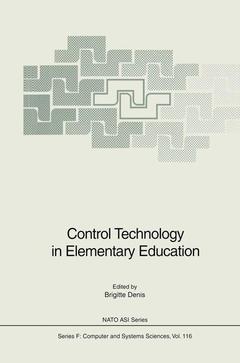Control Technology in Elementary Education, Softcover reprint of the original 1st ed. 1993 NATO ASI Subseries F: Series, Vol. 116
Langue : Anglais
Coordonnateur : Denis Brigitte

Control technology is a new learning environment which offers the opportunity to take up the economic and educational challenge of enabling people to adapt to new technologies and use them to solve problems. Giving young children (and also adults) easy access to control technology introduces them to a learning environment where they can build their knowledge across a range of topics. As they build and program their own automata and robots, they learn to solve problems, work incollaboration, and be creative. They also learn more about science, electronics, physics, computer literacy, computer assisted manufacturing, and so on. This book, based on a NATO Advanced Research Workshop in the Special Programme on Advanced Educational Technology, presents a cross-curricular approach to learning about control technology. The recommended methodology is active learning, where the teacher's role is to stimulate the learner to build knowledge by providing him/her with appropriate materials (hardware and software) and suggestions to develop the target skills. The results are encouraging, although more tools are needed to help the learner to generalize from his/her concrete experiment in control technology as well as to evaluate its effect on the target skills. The contributions not only discuss epistemological controversies linked to such learning environments as control technology, but also report on the state of the art and new developments in the field and present some stimulating ideas.
1. Theoretical Aspects of Learning Environments.- Knowledge Representation and the Learning Process: Taking Account of Developmental Features and Support Features in Interactive Learning Environments.- Reasoning Involved in Control Technology.- Cognitive Spectacles.- Language Control Language: Control Microworlds of the Mind.- What Role Is There for Control Technology in Learning with Computational Expressive Media?.- 2. Experiments and Case Studies.- 2.1. Course Contents.- Robotics and Telecommunication (Experience of the Ecole Active de Malagnou in Geneva Within the Framework of a Computerized Educational Environment).- Could the Robotics/Control Technology Be an Interdisciplinary Tool in School?.- Control Technology and the Creative Thinking Process for Teachers and Students.- 2.2. Methodology.- Integrating the Use of LEGO-LOGO into the Curriculum of a Primary School: A Case Study.- An Aesthetic of Learning Environment Design.- Situation Graphs as Tools for Ordering of Students’ Thinking and Understanding of Actual Existing Servo Mechanisms.- Problems Associated with Getting Control Technology Working in Schools.- Promoting Active Learning: A Pragmatic Approach.- Workshops and Discussion about Educational Situations.- 2.3. The Teacher’s Role.- Educational Uses of Control Technology.- Measuring some Cognitive Effects of Using Control Technology.- 3. Tools Developed for Control Technology.- 3.1. State of the Art.- Workshops.- Hands-on Control Technology with New LEGO Dacta Tools.- 3.2. Future Trends.- A New Development of Control Technology.- A Data Acquisition System in a Learning Environment.- Concurrent Control for Children.- Learning Mode in the Exploration of Parallelism in Pedagogical Robotics.- ActNet-A Heterogeneous Network of Actors for Learning ofParallelism, Communication, and Synchronization.
Date de parution : 12-2012
Ouvrage de 311 p.
15.5x23.5 cm
Thèmes de Control Technology in Elementary Education :
Mots-clés :
Computer Literacy; Hardware; Rover; automata; computer; education; electronics; learning; linear optimization; robot; complexity
© 2024 LAVOISIER S.A.S.
